北师大版(2019)选择性必修第一册 Unit 3 Conservation Lesson 1 The Sixth Extinction课件 (20张ppt)
文档属性
| 名称 | 北师大版(2019)选择性必修第一册 Unit 3 Conservation Lesson 1 The Sixth Extinction课件 (20张ppt) | 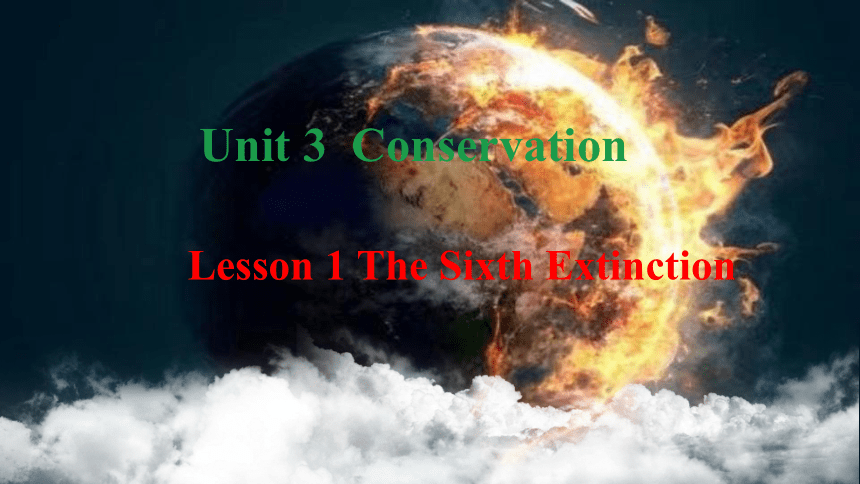 | |
| 格式 | pptx | ||
| 文件大小 | 2.3MB | ||
| 资源类型 | 教案 | ||
| 版本资源 | 北师大版(2019) | ||
| 科目 | 英语 | ||
| 更新时间 | 2022-10-18 17:08:59 | ||
图片预览

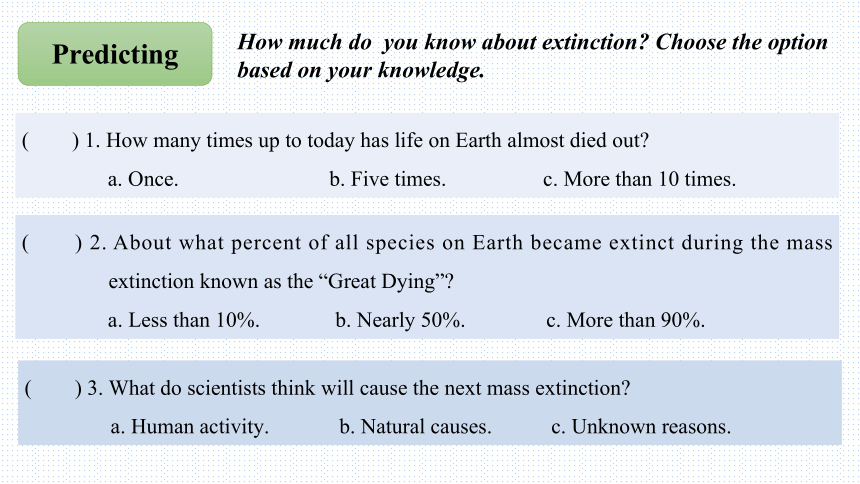
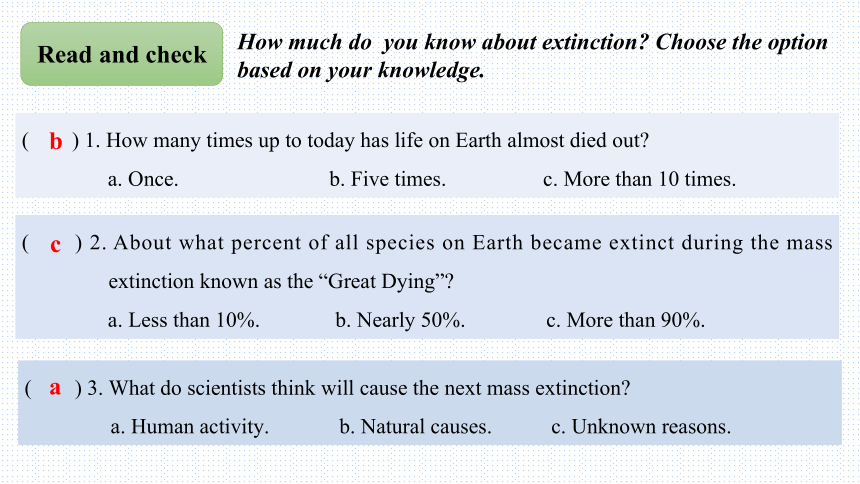
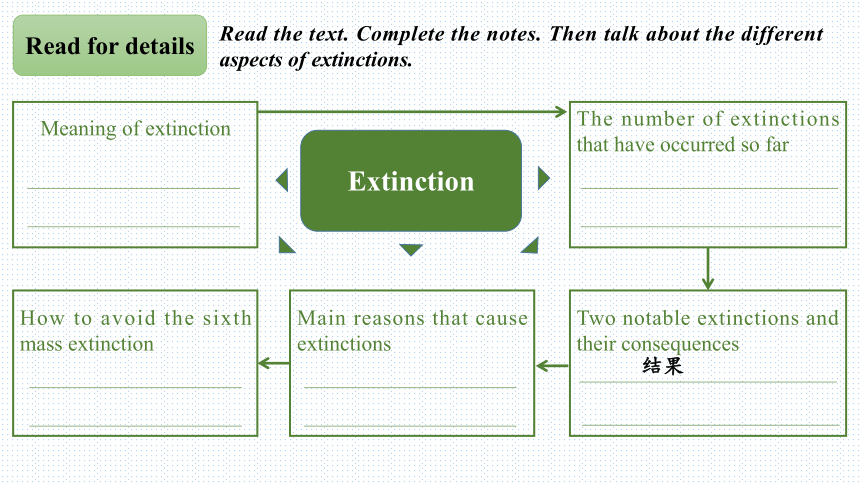
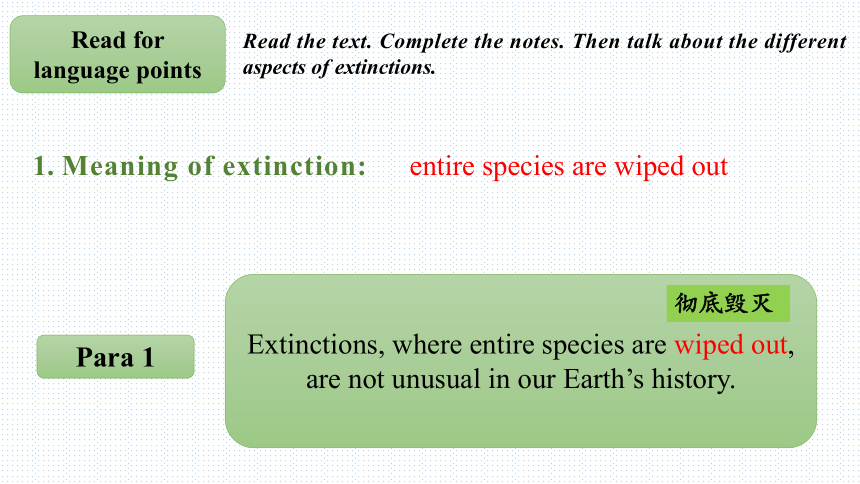
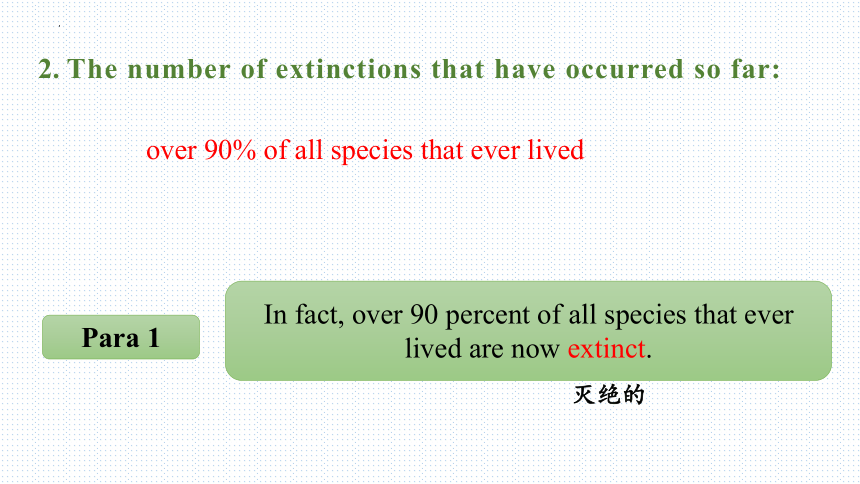

文档简介
(共18张PPT)
Unit 3 Conservation
Lesson 1 The Sixth Extinction
( ) 1. How many times up to today has life on Earth almost died out
a. Once. b. Five times. c. More than 10 times.
How much do you know about extinction Choose the option based on your knowledge.
( ) 2. About what percent of all species on Earth became extinct during the mass extinction known as the “Great Dying”
a. Less than 10%. b. Nearly 50%. c. More than 90%.
( ) 3. What do scientists think will cause the next mass extinction
a. Human activity. b. Natural causes. c. Unknown reasons.
Predicting
( ) 1. How many times up to today has life on Earth almost died out
a. Once. b. Five times. c. More than 10 times.
How much do you know about extinction Choose the option based on your knowledge.
( ) 2. About what percent of all species on Earth became extinct during the mass extinction known as the “Great Dying”
a. Less than 10%. b. Nearly 50%. c. More than 90%.
( ) 3. What do scientists think will cause the next mass extinction
a. Human activity. b. Natural causes. c. Unknown reasons.
b
c
a
Read and check
Meaning of extinction
How to avoid the sixth mass extinction
Main reasons that cause extinctions
Two notable extinctions and their consequences
The number of extinctions that have occurred so far
Extinction
Read the plete the notes. Then talk about the different aspects of extinctions.
结果
Read for details
1. Meaning of extinction:
entire species are wiped out
Read the plete the notes. Then talk about the different aspects of extinctions.
Extinctions, where entire species are wiped out, are not unusual in our Earth’s history.
Para 1
彻底毁灭
Read for language points
2. The number of extinctions that have occurred so far:
over 90% of all species that ever lived
Para 1
In fact, over 90 percent of all species that ever lived are now extinct.
灭绝的
3. Two notable extinctions and their consequences:
Para 1
In the last 500 million years, there have been five times when life on Earth has almost ended. These include
the third mass extinction, known as the “Great Dying”, which killed 90% to 96% of all species. And the fifth event, which occurred 66 million years ago, caused the death of the dinosaurs.
the third mass extinction, which killed 90% to 96% of all species;
the fifth event, which occurred 66 million years ago, caused the death of the dinosaurs
恐龙
包括
4. Main reasons that cause extinctions:
volcanic eruptions, asteroids hitting the Earth from space, changes in sea levels, the decrease of oxygen content of the sea, global warming
Para 1
The reasons for extinctions are varied. According to scientists, they include volcanic eruptions, asteroids hitting the Earth from space, changes in sea levels, the decrease of the oxygen content of the sea and global warming.
原因
多样的
5. How to avoid the sixth mass extinction:
Can a sixth extinction be avoided Experts say that it is not yet too late, if we take action now. This would mean we have to significantly change the way we live. For example, we need to take steps to save endangered species, including setting up special areas where plants and animals can be protected. We need to change how we work and travel by using cleaner, more natural sources of energy, such as wind and solar energy. We also need to improve our farming methods to reduce water, air and land pollution. In short, if we want to survive, we need to stop destroying the planet that we live on and start to protect it.
Para 4
change the way we live, e.g. save endangered species, including setting up special areas where plants and animals can be protected; change how we work and travel by using cleaner, more natural sources of energy; improve our farming methods
Read again. Answer the questions.
1. What did scientists find out in 2015
2. Why does the writer think the sixth mass extinction will come
3. Why does the writer believe we’ll probably die out if 75% of the Earth’s species die out
4. What did people do in the case study to protect black robins Which claim(s) did the case study support in the text
Read for details
1. What did scientists find out in 2015
The study found how quickly species die out due to natural causes, that is the “background extinction rate”. They found that human activity is causing species to die out 1,000 times faster than normal.
Para.2
2. Why does the writer think the sixth mass extinction will
come
Because human activity has negatively affected all other species on Earth, including animals and plants.
Para.2
It is clear that human activity has negatively affected all other species on Earth, including animals and plants.
3. Why does the writer believe we’ll probably die out if 75% of the Earth’s species die out
Because our world and our lives depend on the balance in nature between animals and plants.
Para.3
If a sixth mass extinction occurs, scientists who have studied the issue believe that up to three quarters of all species on Earth could die out. Of course, as we humans depend on so many species for our survival, we would also be at risk of dying out. Our world and our lives depend on the balance in nature between animals and plants. Without forests, we would have no air to breathe, and without clean water we would be unable to survive.
The Black Robin
Black robins are the birds that humans saved from extinction. In 1980, there were only five black robins left in the world. They all lived on a small island off the coast of New Zealand. Only one of those birds, a female called Old Blue, was able to lay eggs. Wildlife workers began a programme for raising black robin chicks. They protected Old Blue’s eggs, helped them to hatch, and took care of the chicks. Thanks to their efforts, there are now more than 250 black robins, and the population is spreading. To help them survive, people are restoring their habitats and removing small animals that hunt them, such as mice and cats from the islands where they live.
Case Study
Notes
robin n. 知更鸟
habitat n. 栖息地
People protected Old Blue’s eggs, helped them to hatch, and took care of the chicks.
People are restoring their habitats and removing pests like mice and cats from the islands where they live.
The case study showed that even in desperate situations, we can do something to help. In short, it’s never too late.
4. What did people do in the case study to protect black robins Which claim(s) did the case study support in the text
In the last 500 million years, there have been five mass extinction events on Earth. In the third event, which 1. __________ the “Great Dying”, 90% to 96% of all species 2. _________. Of course, species died out due to many causes. But nowadays, human activity 3. ___________ all types of species that we 4. ___________ for living. We need to 5. ___________ to avoid the sixth mass extinction. We should 6. __________ to save endangered animals and plants, and 7. _______ special areas to 8. ___________ them before the next extinction comes that may 9. _________ the entire species.
die out be known as have affected depend on wipe out
take steps take action set up take care of
Complete the paragraph about extinctions using the correct form of the phrases below.
is known as
died out
has affected
depend on
take action
take steps
set up
take care of
wipe out
Summary
write an essay to express your opinions on the sixth extinction.
Homework
Let her smile
Don’t let her cry.
Unit 3 Conservation
Lesson 1 The Sixth Extinction
( ) 1. How many times up to today has life on Earth almost died out
a. Once. b. Five times. c. More than 10 times.
How much do you know about extinction Choose the option based on your knowledge.
( ) 2. About what percent of all species on Earth became extinct during the mass extinction known as the “Great Dying”
a. Less than 10%. b. Nearly 50%. c. More than 90%.
( ) 3. What do scientists think will cause the next mass extinction
a. Human activity. b. Natural causes. c. Unknown reasons.
Predicting
( ) 1. How many times up to today has life on Earth almost died out
a. Once. b. Five times. c. More than 10 times.
How much do you know about extinction Choose the option based on your knowledge.
( ) 2. About what percent of all species on Earth became extinct during the mass extinction known as the “Great Dying”
a. Less than 10%. b. Nearly 50%. c. More than 90%.
( ) 3. What do scientists think will cause the next mass extinction
a. Human activity. b. Natural causes. c. Unknown reasons.
b
c
a
Read and check
Meaning of extinction
How to avoid the sixth mass extinction
Main reasons that cause extinctions
Two notable extinctions and their consequences
The number of extinctions that have occurred so far
Extinction
Read the plete the notes. Then talk about the different aspects of extinctions.
结果
Read for details
1. Meaning of extinction:
entire species are wiped out
Read the plete the notes. Then talk about the different aspects of extinctions.
Extinctions, where entire species are wiped out, are not unusual in our Earth’s history.
Para 1
彻底毁灭
Read for language points
2. The number of extinctions that have occurred so far:
over 90% of all species that ever lived
Para 1
In fact, over 90 percent of all species that ever lived are now extinct.
灭绝的
3. Two notable extinctions and their consequences:
Para 1
In the last 500 million years, there have been five times when life on Earth has almost ended. These include
the third mass extinction, known as the “Great Dying”, which killed 90% to 96% of all species. And the fifth event, which occurred 66 million years ago, caused the death of the dinosaurs.
the third mass extinction, which killed 90% to 96% of all species;
the fifth event, which occurred 66 million years ago, caused the death of the dinosaurs
恐龙
包括
4. Main reasons that cause extinctions:
volcanic eruptions, asteroids hitting the Earth from space, changes in sea levels, the decrease of oxygen content of the sea, global warming
Para 1
The reasons for extinctions are varied. According to scientists, they include volcanic eruptions, asteroids hitting the Earth from space, changes in sea levels, the decrease of the oxygen content of the sea and global warming.
原因
多样的
5. How to avoid the sixth mass extinction:
Can a sixth extinction be avoided Experts say that it is not yet too late, if we take action now. This would mean we have to significantly change the way we live. For example, we need to take steps to save endangered species, including setting up special areas where plants and animals can be protected. We need to change how we work and travel by using cleaner, more natural sources of energy, such as wind and solar energy. We also need to improve our farming methods to reduce water, air and land pollution. In short, if we want to survive, we need to stop destroying the planet that we live on and start to protect it.
Para 4
change the way we live, e.g. save endangered species, including setting up special areas where plants and animals can be protected; change how we work and travel by using cleaner, more natural sources of energy; improve our farming methods
Read again. Answer the questions.
1. What did scientists find out in 2015
2. Why does the writer think the sixth mass extinction will come
3. Why does the writer believe we’ll probably die out if 75% of the Earth’s species die out
4. What did people do in the case study to protect black robins Which claim(s) did the case study support in the text
Read for details
1. What did scientists find out in 2015
The study found how quickly species die out due to natural causes, that is the “background extinction rate”. They found that human activity is causing species to die out 1,000 times faster than normal.
Para.2
2. Why does the writer think the sixth mass extinction will
come
Because human activity has negatively affected all other species on Earth, including animals and plants.
Para.2
It is clear that human activity has negatively affected all other species on Earth, including animals and plants.
3. Why does the writer believe we’ll probably die out if 75% of the Earth’s species die out
Because our world and our lives depend on the balance in nature between animals and plants.
Para.3
If a sixth mass extinction occurs, scientists who have studied the issue believe that up to three quarters of all species on Earth could die out. Of course, as we humans depend on so many species for our survival, we would also be at risk of dying out. Our world and our lives depend on the balance in nature between animals and plants. Without forests, we would have no air to breathe, and without clean water we would be unable to survive.
The Black Robin
Black robins are the birds that humans saved from extinction. In 1980, there were only five black robins left in the world. They all lived on a small island off the coast of New Zealand. Only one of those birds, a female called Old Blue, was able to lay eggs. Wildlife workers began a programme for raising black robin chicks. They protected Old Blue’s eggs, helped them to hatch, and took care of the chicks. Thanks to their efforts, there are now more than 250 black robins, and the population is spreading. To help them survive, people are restoring their habitats and removing small animals that hunt them, such as mice and cats from the islands where they live.
Case Study
Notes
robin n. 知更鸟
habitat n. 栖息地
People protected Old Blue’s eggs, helped them to hatch, and took care of the chicks.
People are restoring their habitats and removing pests like mice and cats from the islands where they live.
The case study showed that even in desperate situations, we can do something to help. In short, it’s never too late.
4. What did people do in the case study to protect black robins Which claim(s) did the case study support in the text
In the last 500 million years, there have been five mass extinction events on Earth. In the third event, which 1. __________ the “Great Dying”, 90% to 96% of all species 2. _________. Of course, species died out due to many causes. But nowadays, human activity 3. ___________ all types of species that we 4. ___________ for living. We need to 5. ___________ to avoid the sixth mass extinction. We should 6. __________ to save endangered animals and plants, and 7. _______ special areas to 8. ___________ them before the next extinction comes that may 9. _________ the entire species.
die out be known as have affected depend on wipe out
take steps take action set up take care of
Complete the paragraph about extinctions using the correct form of the phrases below.
is known as
died out
has affected
depend on
take action
take steps
set up
take care of
wipe out
Summary
write an essay to express your opinions on the sixth extinction.
Homework
Let her smile
Don’t let her cry.
同课章节目录
- Unit 1 Relationshis
- Lesson 1 Teachers
- Lesson 2 How Do We Like Teachers’ Feedback?
- Lesson 3 So Close,Yet So Fa
- Unit 2 Success
- Lesson 1 Money vs Success
- Lesson 2 Top Five Secrets of Success
- Lesson 3 Getting to the Top
- Unit 3 Conservation
- Lesson 1 The Sixth Extinction
- Lesson 2 War on Plastic Packets
- Lesson 3 The Road to Destruction
